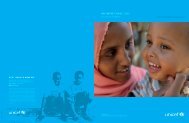Medical supplies and equipment - Unicef
Medical supplies and equipment - Unicef
Medical supplies and equipment - Unicef
You also want an ePaper? Increase the reach of your titles
YUMPU automatically turns print PDFs into web optimized ePapers that Google loves.
the Former Yugoslav Republic of Macedonia,<br />
supply assistance shifted from<br />
large-scale provision to smaller procurement<br />
of <strong>supplies</strong> required for capacitybuilding<br />
<strong>and</strong> advocacy. In this region,<br />
offshore procurement is generally more<br />
significant than local procurement<br />
because of shortages of raw materials,<br />
fluctuating exchange rates <strong>and</strong> difficulties<br />
in establishing a reliable network of<br />
suppliers. In Kosovo, Supply Division<br />
worked with the UNICEF country office<br />
to design a contract for <strong>and</strong> manage a<br />
large-scale school reconstruction project<br />
that is being implemented by local NGOs.<br />
It is expected that 22 new schools will<br />
be finished by October 2001, <strong>and</strong> another<br />
37 schools have had their water supply<br />
<strong>and</strong> sanitation facilities repaired <strong>and</strong> upgraded.<br />
The Americas <strong>and</strong> the Caribbean accounted<br />
for just 3% of UNICEF’s total<br />
supply volume. In most countries of the<br />
region, the supply component of country<br />
programmes is fairly low, although in<br />
Cuba <strong>and</strong> Haiti, for example, UNICEF<br />
provides substantial supply assistance.<br />
Most procurement is done locally, given<br />
the strong supplier base in the region.<br />
In Guyana, the supply portion<br />
of the UNICEF programme declined<br />
14 SUPPLY DIVISION ANNUAL REPORT 2000<br />
because of the increased capacity of<br />
the Government to procure essential<br />
drugs. The office in Mexico was able<br />
to source ORS for Belize as well as a<br />
water purification plant for Guatemala.<br />
The Guatemala office reviewed all<br />
of its procurement processes, including<br />
a planning exercise for emergency<br />
<strong>supplies</strong> which resulted in 14 st<strong>and</strong>by<br />
agreements with different suppliers<br />
to provide specific <strong>supplies</strong><br />
during the first 48 hours of an emergency.<br />
Procurement<br />
Services<br />
T hrough<br />
Procurement Services,<br />
UNICEF leverages additional re-<br />
OPV funded by the Government of Japan en route from the manufacturer’s production plants in Italy <strong>and</strong><br />
Belgium to Dhaka, Bangladesh, for the National Immunization Days held in November 2000. The chartered<br />
aircraft carried 30 million doses of vaccine.<br />
sources for children by using the expertise<br />
<strong>and</strong> operations of its global supply<br />
function to purchases strategic <strong>supplies</strong><br />
on behalf of Governments, other United<br />
Nations agencies <strong>and</strong> NGOs. During<br />
2000, Supply Division received Procurement<br />
Services orders totaling $67 million<br />
to provide essential <strong>supplies</strong> for<br />
women <strong>and</strong> children in 87 countries,<br />
largely vaccines, immunization <strong>supplies</strong><br />
<strong>and</strong> pharmaceuticals.<br />
UNICEF/SD/00/F. Blanco<br />
UNICEF <strong>and</strong> the Government of India<br />
signed a three-year agreement to strengthen<br />
immunization in India, with $110 million<br />
financed through a World Bank development<br />
credit. Under the first phase<br />
of the agreement, UNICEF India purchased<br />
$23 million worth of OPV from<br />
Indian suppliers, part of the 800 million<br />
total doses procured in India in 2000.<br />
Supply Division purchased a total of<br />
$21million worth of vaccines using Procurement<br />
Services funding. Some $6.5<br />
million was used to provide vaccines for<br />
17 countries whose Governments signed<br />
a formal Memor<strong>and</strong>um of Underst<strong>and</strong>ing<br />
with UNICEF (Benin, Gambia, Ghana,<br />
Maldives, Kazakhstan, Turkmenistan,<br />
Uzbekistan, Lesotho, Lebanon,<br />
Pakistan (which alone accounted for $4.9<br />
million),Venezuela, Philippines, Tanzania,<br />
Togo, Ug<strong>and</strong>a, Gabon <strong>and</strong> Yemen).<br />
Another $5.5 million purchased vaccine<br />
for 13 countries under the Vaccine Independence<br />
Initiative (Bangladesh, Burkina<br />
Faso, Cape Verde, Chad, Gabon, Kenya,<br />
Mali, Mauritania, Cambodia,<br />
Morocco, Fiji, Philippines, Senegal).<br />
Under the Initiative, which was originally<br />
approved by UNICEF’s Executive<br />
Board in 1991, countries have access to<br />
a revolving fund to procure vaccines<br />
with their own currencies, through the<br />
Procurement Services mechanism.<br />
Another important contributor to Procurement<br />
Services is the Japanese International<br />
Cooperation Agency (JICA),<br />
who provided funding for <strong>supplies</strong><br />
amounting to almost $10 million in 2000.<br />
Almost half of the total, $4.5 million, funded<br />
vaccines for 24 countries. JICA funding<br />
also provided essential drugs <strong>and</strong><br />
medical <strong>supplies</strong> to a number of countries<br />
in Asia, including East Timor <strong>and</strong><br />
Myanmar. UNICEF also provided vaccines<br />
to Bangladesh <strong>and</strong> Ghana using<br />
World Bank funding, as well as OPV for<br />
India using funding provided by the<br />
German Development Bank (KfW).





